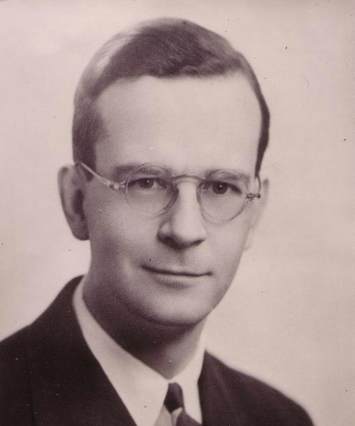Morris Martin was secretary and aide to Frank Buchman, founder of Moral Re-Armament
Morris Martin was one of the brightest Oxford students of his pre-war generation. He gained a First in Classics at Wadham College and was awarded a Harmsworth Senior Scholarship at Merton College, where his PhD dissertation was on ‘law and the community’. He was a talented philosopher, linguist, writer and poet. Despite his intellectual brilliance, he was an unassuming personality and an acute and sensitive observer of human affairs.
He was a close associate of Dick Crossman and other Oxford luminaries. However, in 1936 he turned down several offers of teaching posts at Oxford, and the possibility of a distinguished career in the Foreign Office or the Home Civil Service, in favour of becoming executive assistant to Frank Buchman, initiator of Moral Re-Armament (MRA).
The international movement for ‘world changing through life changing’, which Buchman launched in 1938 as an extension of his Oxford Group, gave Martin no guarantee of remuneration. It seemed a considerable sacrifice but he worked for Buchman for 25 years, until the latter’s death in 1961, and never seemed to have regretted his choice. In Martin’s autobiography Always a little further (2001), he described himself in scriptural terms as ‘a lucky fellow’.
Martin gave devoted service to Buchman, especially after Buchman was partially disabled by a stroke in 1942. Martin and a number of other British, who remained at Buchman’s side in America during World War Two, were much criticized by a section of the media for alleged swanning. However, as seen from my desk in the British embassy in Washington at the time (serving as assistant to Isaiah Berlin), these attacks were unjust. The circumstances leading to Martin’s presence in the United States were totally different from those surrounding W H Auden and Christopher Isherwood.
They had gone with Buchman to the USA in the spring of 1939, at the invitation of senior American public figures, to launch their campaign for moral rearmament in New York and Washington. President Roosevelt had approved of their initiative and had named Senator Harry Truman as his contact with them. Truman remained closely in touch with Buchman’s work throughout the war and, in his capacity as Chairman of the Senate War Investigation Committee, paid tribute to their morale-building efforts in the run up to America’s involvement in the war. In November 1943, Truman said: ‘There is not a single industrial bottleneck I can think of which could not be broken in a matter of weeks if this crowd were given the green light to go full steam ahead.’
After the war, Paul Hoffman, Administrator of the Marshall Plan, also paid tribute to MRA’s work in Europe, especially in assisting Franco-German reconciliation, as providing ‘the ideological equivalent of the Marshall Plan’.
During this period, Martin, using his linguistic skills, became an influential go-between for Dr Buchman with Chancellor Adenauer, Robert Schuman, the French foreign minister, and other European leaders. Adenauer said later that ‘MRA has given most valuable stimulation to the great work of uniting Europe’.
Martin also travelled widely in the post-war period at Buchman’s side during his campaigns in Asia, Australia and New Zealand.
After Buchman’s death, Martin returned to his academic career, becoming in turn Dean of Faculty at Mackinac College, Michigan, educational director of the Up With People movement in the USA, an offshoot of MRA, and finally as a visiting professor at Princeton and the University of Arizona.
Martin married Enid Mansfield, daughter of a British MP, in 1946 and, as she was a skilled secretary, they worked closely together at Buchman’s side. She died in 1976 and in 1988 Martin married Ora DeConcini, widow of an Arizona judge. They enjoyed life together in Tucson until her death in 2003. Martin had no children of his own but he greatly enjoyed the company of a large number of nephews and nieces from his own family and the DeConcini family.
Dr Morris Martin, classics scholar, Moral Re-Armament campaigner and educator, born London 3 November 1910, married Enid Mansfield 1946 (died 1976), married Ora DeConcini 1988 (died 2003), died Tucson, Arizona, 17 May 2007.
Spansk


